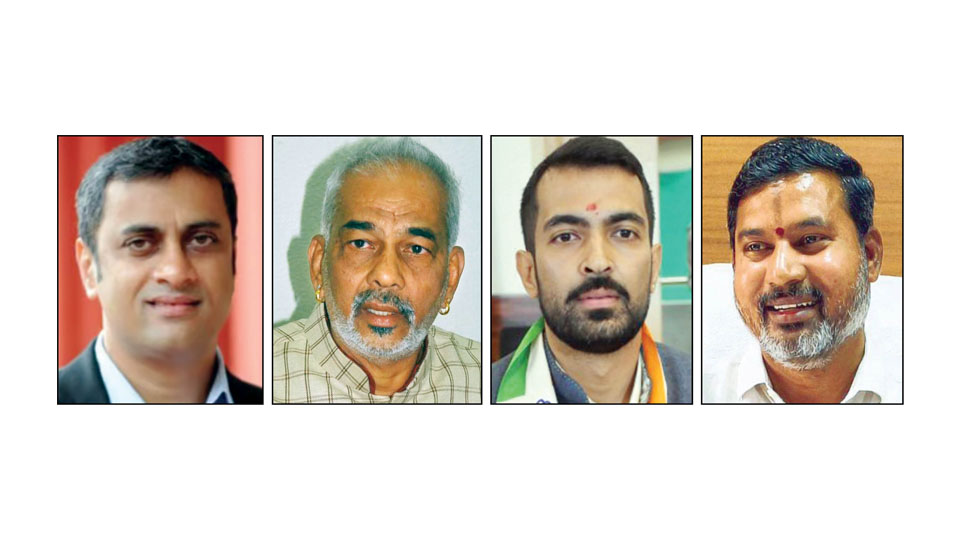28
28
28
28
28
28
Rishi’s Ramana Avatara to release in Telugu as well
Ramana Avatara pairs Rishi with Shubra Aiyappa and Pranitha Subash. The film is set to hit theatres shortly.
Kannada actor Rishi has not had a theatrical release since 2019’s Sarvajanikarige Suvarnavakasha. He was seen in cameos in not one, but three Kannada films – Mugilpete, One Cut Two Cut and Thurthu Nirgamana – and had a direct-to-OTT film Nodi Swamy Ivanu Irode Heege during the pandemic. His film Ramana Avatara has been ready for a while and Rishi was hoping to have it in theatres sometime in the second half of 2023, after his Telugu web series debut Shaitaan, but that did not happen.
Watch Rishi romance Shubra Aiyappa in the peppy number Rama is a Gentleman
The team is now on the lookout for a release date, with April the most likely candidate, but what’s also happening is that Ramana Avatara will no longer be just a Kannada film. It is officially a bilingual release with a Telugu version also being readied, given Rishi’s new-found popularity in those markets following the success of Shaitaan and that he is now working on Nandamuri Balakrishna’s untitled 109th project as antagonist, along with Bobby Deol. Rishi also has another Telugu film in his kitty in which he plays the lead.
Rishi’s next in Telugu is period drama along with Faria Abdullah & Thiruveer
Ramana Avatara, by director Vikas Pampapathi, is a comedy that has Rishi play the title character Rama, whose post break-up venture sees him try something to stop the migration of educated youth from his village to the city. The film also stars Shubra Aiyappa, Pranitha Subhash, Anirudha Acharya, among others, and has music by Judah Sandhy.
Ramana Avatara: Lead actor Rishi’s transition from theatre to cinema involved a lot of unlearning
Rishi, who has just wound up work on a film called Rudra Garuda Purana, in which he plays a cop yet again after Kavaludaari, has been vocal about the need to deliver on what’s been promised in his films, so that audiences do not feel cheated when they watch it in theatres. “When I say that I have made an entertainer and that I would like people to come to theatres, I have to live up to that promise,” he had said.
source: http://www.ottplay.com / OTT Play / Home> News / by Team OTT Play / February 16th, 2024
Assembly Debates Encroached Lands By Coffee Growers

MLAs want encroached lands to be leased to large holders and sanction land to small holders
Bengaluru:
Encroachment of Government land by small coffee growers in the coffee-growing regions of Kodagu was discussed in the Legislative Assembly yesterday, where Virajpet MLA A.S. Ponnanna appealed to the Government to permanently sanction the lands to their names as they are actively cultivating crops on those lands.
Participating in a discussion on the subject, Ponnanna said that small growers in Kodagu who are cultivating coffee and other crops in two to three acres of land are facing numerous problems.
“In certain areas, small coffee growers find themselves surrounded by large private plantations, with Government land in between that has been encroached upon. According to the law, land can be leased out for up to 25 acres. Large Government lands encroached upon by major growers should be leased out by the Government,” he said.
“However, small-scale growers, who only have two to three acres of land and have encroached upon small portions of Government land, require a permanent solution. The Government should sanction the encroached land in their names to provide them with a permanent relief about their holdings,” Ponnanna explained.
Earlier, Sakleshpur MLA ‘Cement’ Manju mentioned that during the tenure when R. Ashoka served as the Revenue Minister in the previous BJP Government, a decision was made to lease the encroached Government land to coffee growers for a duration of 30 years. Unfortunately, due to a change in Government, this decision was not put into action. Therefore, he urged the Government to resume the process of leasing the land for a period of 30 years.
Later, Madikeri MLA Dr. Mantar Gowda raised questions regarding why the BJP Government did not implement the leasing of land to coffee growers for 30 years. He emphasised the importance of discussing pending applications, particularly the 53rd and 57th applications, which have been awaiting decisions for 20-25 years.
He expressed satisfaction with leasing the land to Race Courses and Clubs for 30 years and wanted similar leasing to coffee growers to get permanent ownership by approving the 53rd and 57th applications. He cautioned that leasing land for 30 years could lead to future problems for the growers and suggested considering leasing the land for 99 years instead.
Intervening in the discussion, Speaker U.T. Khader said approval of land up to 3 acres for the poor could offer a permanent solution to the issue at hand.
At this point, Dr. Mantar Gowda’s father, A. Manju, who is also the JD(S) MLA from Arkalgud, intervened, questioning why the Government was hesitating to lease land to farmers while providing it for Race Courses, Resorts and Clubs.
“Why there is a delay in approving the land lease when it comes to farmers? The law prohibits leasing out land for more than 30 years. Can you take back encroached land from cultivators? It is not possible. I suggest leasing out the land to encroachers. This way, the Government would earn revenue and the lessees would benefit as well. They would also help conserve forests and contribute to the environment, he added.
Later, MLA A.S. Ponnanna spoke, urging to sanction the encroached land for small-scale coffee growers as well as to provide land for lease to large coffee growers.
What are 50th, 53rd and 57th applications?
The Bagar Hukum system, established by the State Revenue Department, requires applicants to submit Form 57 for the legalisation of agricultural land.
The Bagar Hukum scheme traces its origins back to 1980 when the Government allocated two acres of land to landless farmers for agricultural activities. However, the beneficiaries of this scheme did not receive the title deed for the land they cultivated.
Subsequently, applications were invited in the forms of Form 50 (1991), Form 53 (1999) and Form 57 (2018) under the Karnataka Land Revenue Act, 1964. The application window extended until April 2023, exclusively for those who have been engaged in cultivation for the past 15 years.
According to Madikeri MLA Dr. Mantar Gowda, who raised the issue in the Assembly, all the applications received in Form 50, Form 53 and Form 57 are pending since the last 25 years. If these applications are approved, growers can gain permanent ownership over the land.
source: http://www.starofmysore.com / Star of Mysore / Home> News / February 23rd, 2024
Karnataka skier from 900-m altitude village wins three golds on 4,000m high slopes of Gulmarg
Bhavani Thekkada Nanjunda won gold by topping the 10-km Nordic ski competition, 1.6-km sprint and 5-km sprint

Bhavani Thekkada Nanjunda, from Napoklu village in Karnataka’s Kodagu district, glides over snow slopes the way fish take to water. The athlete, born in a village only 900 m above sea level, won three golds by competing on the snow slopes at an altitude of 4,000 m in the Khelo India Winter Games here on Sunday.
The lean girl from the plains near the Cauvery in Karnataka has sparkled in the winter games with her stunning ski skills. She won gold by topping the 10-km Nordic ski competition, 1.6-km sprint and 5-km sprint.
“It’s all about pursuing your passion. A girl from Karnataka winning winter sports in Kashmir is enough to talk about my passion. We have no snow in Karnataka. I have to work harder than those who compete from the Himalayan States,” Ms. Nanjunda said.
Passionate about mountains, Ms. Nanjunda was formally introduced to mountains when she summited Mt. Rudegera in Uttarakhand as a National Cadet Corps member in 2014. One year later in 2015, she worked through the freezing winter months for a basic course at the Himalayan Mountaineering Institute, Darjeeling, and managed to summit Renok peak.

“I work on my endurance at home by running every day. My physical activities puzzle my neighbours and friends at times. It does not stop me,” she said.
Ms. Nanjunda awaits the whole year for the winter months to visit Kashmir and hit the ski slopes. “Skiing makes me feel happy. Gulmarg is the best ski destination. I keep waiting for winter months to be here, as the place has the best slopes,” Ms. Nanjunda said.
International instructor certificate
She became a student of the Jawahar Institute of Mountaineering and Winter Sports (JIM&WS), Pahalgam, Kashmir, in 2019 and received an international instructor certificate in skiing in 2019. In 2020, she became a ski instructor with JIM&WS.
“Principal and the instructor at JIM&WS encouraged me to participate as a cross-country skier. I have participated in all the four editions of the Khelo India Winter games. I am happy that Karnataka has emerged as the number two State in the games this year,” Ms. Nanjunda said.
She is now preparing for the Asian Championship and Olympics. “I desire to represent India in the Olympics in 2026. India has never qualified for cross-country skiing,” she added.
The winter games in Kashmir are proving to be the platform for women, even from non-snow States of the country, to dream big in these sports. From mere four girls participating in the first edition of the winter games in Gulmarg, the number has risen to 20 this year.
source: http://www.thehindu.com / The Hindu / Home> News> India / by Peerzada Ashiq / February 25th, 2024

